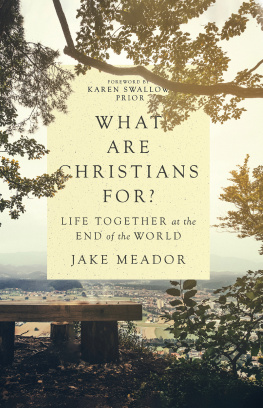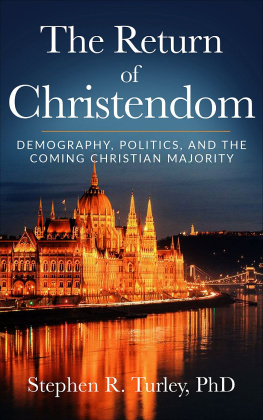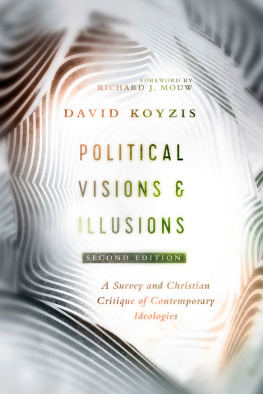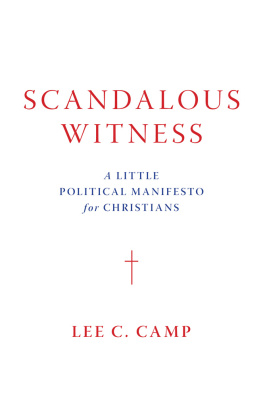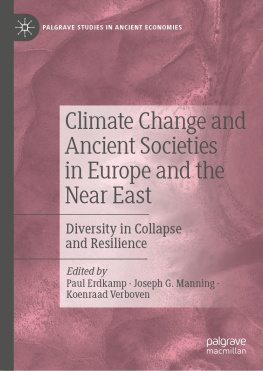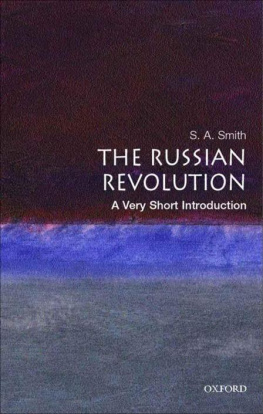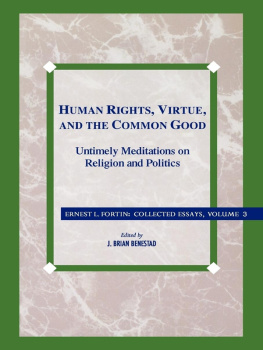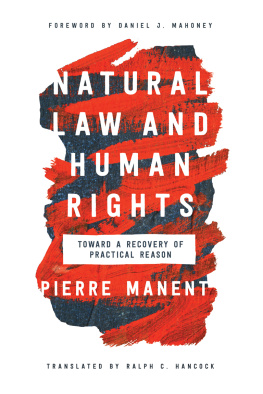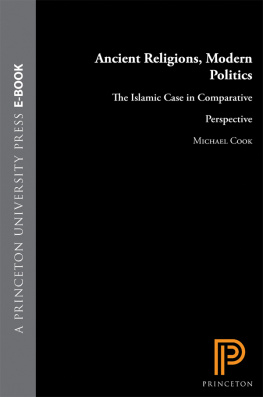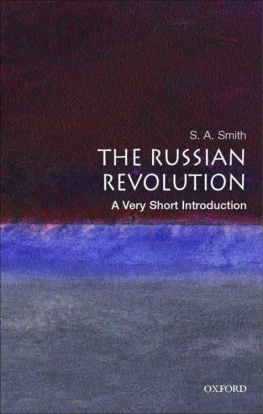Sommaire
Pagination de l'dition papier
Guide
FOREWORD BY
KAREN SWALLOW PRIOR
WHAT
ARE
CHRISTIANS
FOR?
LIFE TOGETHER at the
END of the WORLD
JAKE MEADOR
InterVarsity Press
P.O. Box 1400, Downers Grove, IL 60515-1426
ivpress.com
2022 by Jacob R. Meador
All rights reserved. No part of this book may be reproduced in any form without written permission from InterVarsity Press.
InterVarsity Press is the book-publishing division of InterVarsity Christian Fellowship/USA, a movement of students and faculty active on campus at hundreds of universities, colleges, and schools of nursing in the United States of America, and a member movement of the International Fellowship of Evangelical Students. For information about local and regional activities, visit intervarsity.org.
Scripture quotations, unless otherwise noted, are from The Holy Bible, English Standard Version, copyright 2001 by Crossway Bibles, a division of Good News Publishers. Used by permission. All rights reserved.
While any stories in this book are true, some names and identifying information may have been changed to protect the privacy of individuals.
The publisher cannot verify the accuracy or functionality of website URLs used in this book beyond the date of publication.
Cover design and image composite: David Fassett
Images: forest above city: borchee / E+ / Getty Images
old tree with sun rays: dem-belitsky / iStock / Getty Images Plus
paper texture: Katsumi Murouchi Moment / Getty Images
ISBN 978-0-8308-4737-2 (digital)
ISBN 978-0-8308-4736-5 (print)
This digital document has been produced by Nord Compo.
To Ambrose Fredstrom Meador,
may you, like your namesakes, always see and love the
wounded and call them to the life of peace.
To the memory of Fr. Teddy Molyneaux,
a faithful priest and courageous Christian. I look forward
to meeting again on the other side of the river.
You who have watched the wings of darkness lifting
and heard the misted whisper of the sea,
shelter your heart with patience now, with patience,
and keep it free.
Let not the voiced destruction and the tumult
urge to a lesser prize your turning mind;
keep faith with beauty now, and in the ending
stars you may find.
JANE TYSON CLEMENT
A theology for our time should help us to know that Being is indeed the theater of Gods glory, and that, within it, we have a terrible privilege, a capacity for profound error and grave harm. We might venture an answer to Gods question, Where were you when I created? We were there, potential and implicit and by the grace of God inevitable, more unstoppable than the sea, impervious as Leviathan, in that deep womb of time almost hearing the sons of God when they shouted for joy. And we are here, your still-forming child, still opening our eyes on a reality whose astonishments we can never exhaust.
MARILYNNE ROBINSON
Whoever will not be persuaded that he is able to establish a kingdom of heaven on earth or make out of his own home or situation a house or temple of God is heading toward the devil. For where there is service to God, there is heaven. When I serve my neighbor, I am already in heaven, for I am serving God.
MARTIN LUTHER
FOREWORD
Karen Swallow Prior
A nswers to the hardest and most complicated questions we face as human beings start to become clearer when we consider telos, or purpose, regarding the components of a given dilemma. Why does this thing exist? What is it for? What is the purpose of this relationship? Of human life? How do we best fulfill our purpose and help others do the same? These questions ought to be asked of forests, railroads, cellphones, and fountain pens as well as of people and communities and institutions. And, as Jake Meador asks in the pages that follow, we ought to ask what Christians are for too.
It is the mark of particularly modern Christians that we have given so much attention to what we do (morality) and what we think (worldview) that we have perhaps forgotten to consider why we are here. It has taken most of my life for me to begin to see what this book reveals so clearly and compellinglythat Christian purpose consists of more than what we do or how we think. Even as someone born into a Christian home and a church-loving family, I became good at compartmentalizing my Christian faith from the rest of life. I didnt even have to try. I was born again but didnt know how to live because I didnt know what my life was for.
I dont think I am alone. For many believers right now, it feels a bit like the end of the world, or at least the end of a world. It seems like the churchor at least the twenty-first century American evangelical churchhas reached the limits of what right thinking and doing can do for our souls, let alone for the lives we must live togetherbeliever and unbeliever, red state and blue state, urban and rural, healthy and sick, needed and needyuntil our lives and this world really do meet their end.
What Are Christians For? Life Together at the End of the World offers moving reminders of times and places in other parts of history that surely felt like the end of the world for those living in them, including those in the church: American slavery, South African apartheid, Nietzsches existential Europe, and the horrors of the Great War (which would, of course, be followed by even greater horrors decades later).
In fact, it was during this turn-of-the-century context when the Dutch theologian Herman Bavinck developed and articulated his influential idea of the Christian worldview, largely as a response to the insufficient, even false and dangerous, worldviews prevailing in his own age and influencing the church of the time. This history, noted later in this book, reminds us that we who feel out of sorts in the world today are not alone. The peculiarity of this moment, Bavinck observed of his own moment, as aptly as it could be of our own, is that everyone feels an epoch of change, when all people realize they cannot remain the same, and that some long for this moment to pass by more swiftly than others. There is a disharmony between our thinking and feeling, between our willing and acting. The words remind us that while the specifics change according to time and circumstance, the calling of Christians remains the same.
This is why the pages that follow in this book are oddly comforting. Jake Meador reminds us that the purpose of the Christian life never changes according to time, place, or station, even if we of particular places and perspectives have difficulty seeing and applying such a complete vision in whole.
Our view is clouded by many things, most of these the consequences of the distortions of modernity. (To be clear, every era has its own deceptions.) Even Christians who believe in and live by the orthodox doctrines of the historic church cant help but be formed also by our larger cultural ethos in which nature is reduced to matter, community is replaced by institutions, the soul is narrowed into a self, and the body becomes merely the sum of its parts. The idols of the worldindeed, the mere idols of modern Americahave sometimes, even many times, become idols in the church. We are fools if we fail to recognize that even a Christian worldview based on unchanging eternal truths is not a clouded lens.

